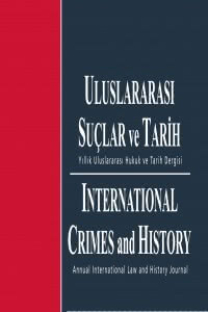İHMAL EDİLMİŞ DAĞLIK-KARABAĞ ANLAŞMAZLIĞINDA, HOCALI SOYKIRIMI’NIN İHMAL EDİLMESİNİN NEDENLERİ
Eğer, 26 Şubat 1992 tarihinde Hocalı, Azerbaycan’da 600’den fazlainsan kasıtlı olarak bir grup tarafından öldürüldü ise; neden uluslararasıcamianın baskın üye ülkeleri [özellikle de Avrupa Birliği (AB), AvrupaGüvenlik ve İşbirliği Teşkilatı (AGİT), ve Birleşmiş Milletler GüvenlikKonseyi (BMGK)] katliamın soykırım olduğunu kabul etmedi de;Meksika, Pakistan ve Kolombiya bu şekilde tanıdı? Küresel güçler,cürümün soykırım düzeyinde işlenmemesinden değil, iki anahtar sebepile vakayı soykırım olarak tanımamaktadırlar. Bunların birincisi,olayların soykırım olarak teyit edilmesinin uluslar arası siyasi veekonomik çıkarlarına yararı olmaması; ikincisi ise, ikrarın iç siyasiçıkarlara (çıkar gruplarınca tanımlanan) fayda sağlamamasıdır. Buçalışma, var olan Realpolitik teorisinin önceliği savını, ihmal edilmişİnsan Hakları meselelerinin ışığında (Bu hususta Hocalı Katliamı),geliştirmektedir. Çalışma insan hakları ve realizm arasındaki çarpışmateorisine dayanmaktadır ve Hocalı Katliamı üzerine yazın sınırlılığınıneksikliğini özetlemektedir. Çalışma, katliamın tanınmasında önemli roloynayan dokuz ülkeye odaklanır (Amerika Birleşik Devletleri, Rusya,Fransa, Almanya, Türkiye, İsrail, Pakistan, Meksika ve Birleşik Krallık),ve bu ülkelerin meseleye şimdiki yaklaşımlarını; Hocalı Katliamınıtartışırken belirli ülkelerin realist yaklaşımına güçlü kanıtlar sağlayanuzman görüşü ve veriler ışığında gözlemler
Anahtar Kelimeler:
Hocalı, Katliam, Soykırım, Dağlık Karabağ
REASONS FOR THE NEGLECTED KHOJALY GENOCIDE IN THE NEGLECTED NAGORNO-KARABAKH CONFLICT
If “more than 600 people were killed” intentionally by onegroup of people on February 26, 1992 in Khojaly, Azerbaijan, why is itthat the dominant member states of the international community—specifically the European Union (EU), the Organization of Security andCo-Operation in Europe (OSCE), and the United Nations SecurityCouncil (UNSC)—have not accepted that the massacre was genocide,while only three states, Mexico, Pakistan and Colombia, have alreadyrecognized it as such (“Pakistani Senate Recognizes” 2012)? Globalpowers do not recognize the case as genocide, not because the killingswere not committed at a level of genocide, but because of two keyfactors: first, confirmation of the occurrence of the genocide does notbenefit their international political and economic interests and second,recognition does not benefit their internal political interests (defined byinterest groups). This research paper develops an existing argument ofthe primacy of the theory of Realpolitik in light of neglected humanrights issues, in this case the Khojaly massacre. The paper builds on themain theory of the clash between human rights and realism and thenoutlines the shortcomings of the limited literature on the Khojalymassacre. The paper focuses on nine countries that have played animportant role in the discussion of the recognition of the massacre (U.S.,Russia, France, Germany, Turkey, Israel, Pakistan, Mexico, and UK),and observes their current approach to the issue through expert opinionand data that strongly yields evidence for the realist approach of certaincountries in discussing the Khojaly massacre
Keywords:
Hodjaly, Massacre, Genocide, Nagorno-Karabakh,
___
- “Maine’s House of Representatives adopts resolution on Khojaly.”News.az, March 23, 2012. http://www.news.az/articles/politics/56937. Last Accessed: April 10, 2012.
- “Pakistani Senate Recognizes Events in Azerbaijani Town of Khojaly as Genocide.” Journal of Turkish Weekly. 2012.
- http://www.turkishweekly.net/news/130 865/pakistani-senaterecognizes-events-in-azerbaijani-town-of-khojaly-as-genocide.html. Last Accessed: February 17, 2012.
- “About Us.” 4IMN (4 International Media & Newspapers), 2012, http://www.4imn.com/menu/about.htm#ranking Last Accessed: March 20.
- “Azerbaijan Honors Victims of 1992 Massacre.” The Guardian, February 26, 2012.
- http://www.guardian.co.uk/world/feedarticle/10113944. Last Accessed: April 3, 2012.
- “Azerbaijan, Mexico to Boost Energy Cooperation.” New Europe, November 15, 2009. http://www.neurope.eu/article/azerbaijanmexico-boost-cooperation. Last Accessed: March 10, 2012. “Hocali.”Hurriyet. 2012.
- http://arama.hurriyet.com.tr/arama.aspx?t=Hocal%C4%B1. Last Accessed: April10, 2012. “Khojali.” Bild. 2012.
- http://www.bild.de/suche.bild.html?type=article&query=Khojali, Last Accessed: April 25, 2012.
- “Khojali.” El Universal. http://historico.eluniversal.com.mx/buscadorf.html?q=Khojali&x=0 &y=0. Last Accessed: March 20, 2012.
- “Khojali.” The Dawn.Last. 2012. http://dawn.com/search/?cx=partnerpub-8258178831251847%3A5337004877&cof=FORID%3A10&ie =UTF-8&q=khojali&sa=Search. Last Accessed April 5, 2012.
- “Khojali.” The New York Times. http://query.nytimes.com/search/sitesearch/#/khojaly/. Last Accessed: April 20, 2012.
- “Le Monde publishes Azerbaijani diplomat’s reply to Armenian diaspora.” TREND. January 19, 2011.
- http://en.trend.az/news/karabakh/1814081.html. Last Accessed: March 16, 2012.
- “Pakistan and Azerbaijan to strengthen economic ties.”New Europe, August 17, 2011. http://www.neurope.eu/article/pakistan-andazerbaijan-strengthen-economic-ties. Last Accessed March 3, 2012.
- “Plusieurs morts dans un affrontement à la frontière entre l’Azerbaïdjan et l’Arménie.” Le Monde. 2010.
- http://www.lemonde.fr/europe/article/2010/09/01/plusieurs-mortsdans-un-affrontement-a-la-frontiere-entre-l-azerbaidjan-et-l-armenie _1405130_3214.html. Last Accessed: September 9, 2012.
- “Researchers of Holocaust Visit Exhibition Devoted to Khojaly Genocide.” Contact, February 24 2012.
- http://www.contact.az/docs/2012/Politics/02242287en.htm. Last Accessed: February 27, 2012.
- ISSN: 1306-9136
- Yayın Aralığı: Yıllık
- Başlangıç: 2006
- Yayıncı: Terazi Yayıncılık Basım Dağıtım Danışmanlık Eğitim Organizasyon Matbaacılık Kırtasiye Tic. Ltd. Şti.
Sayıdaki Diğer Makaleler
SSCB`DE YARI-ÖZERKLİĞİN HUKUKİ DURUMU: DAĞLIK KARABAĞ ÖZERK BÖLGESİ ÖRNEĞİ
Gülşen PAŞAYEVA, Irada BAĞİROVA, Kamal MAKİLİALİYEV, Ferhad MEHDİYEV
BALKAN SAVAŞLARI’NDAN YÜZYIL SONRA EVİRİLEN TÜRK-SIRP İLİŞKİLERİNİN BİR GÜNCESİ
A CHRONICLE OF EVOLVINGTURKISH-SERBIAN RELATIONS A CENTURY AFTER THE BALKAN WARS
AZA BEAST : SAVAŞIN KÖKLERİNE İNMEK
İHMAL EDİLMİŞ DAĞLIK-KARABAĞ ANLAŞMAZLIĞINDA, HOCALI SOYKIRIMI’NIN İHMAL EDİLMESİNİN NEDENLERİ
SÖMÜRGECİLİK, ALMANYA’NIN DENEYİMLERİ VE TARİHE YANSIMALARI
COLONIALISM, GERMAN EXPERIENCE AND THE REFLECTIONS ON HISTORY
